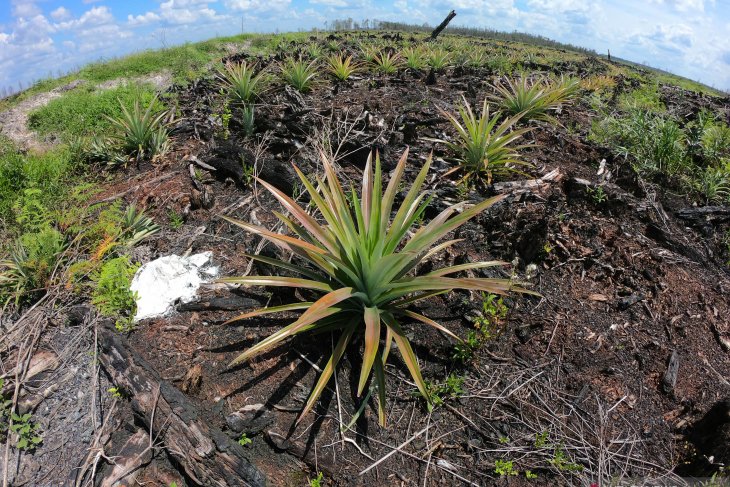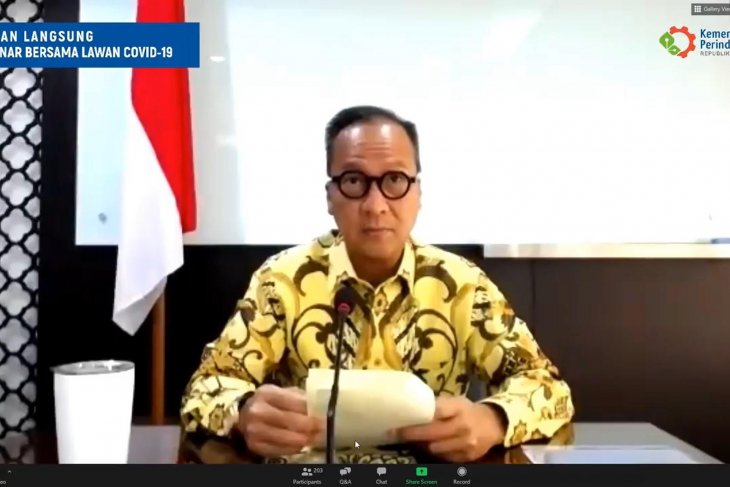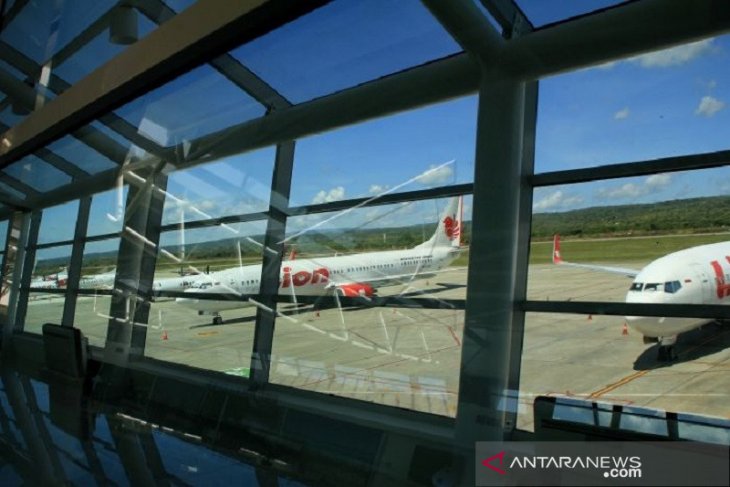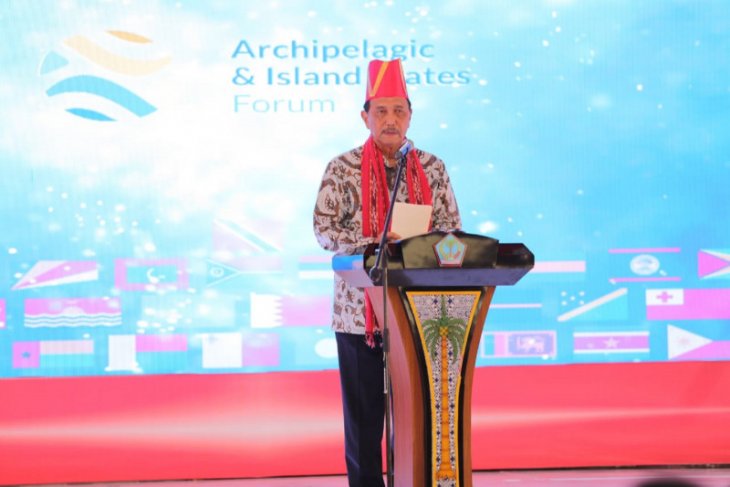Live Streaming
Program Highlight
Company Profile
June
Germany Assists Indonesia's Peat Protection, Management
Written by Ani Hasanah
A view of a peatland area in Jambi, Sumatra Island. ANTARA FOTO/Wahdi Septiawan/aww
Germany, through the Deutsche Gesellschaft für Internationale Zusammenarbeit (GIZ) GmbH, allocated a three-million euro grant for peat protection and management in North Kalimantan (Kaltara), conducted jointly with the Environmental Affairs and Forestry (KLHK) Ministry.
The ministry's Directorate of Peat Damage Control with GIZ here on Tuesday (June 9) spoke of the Implementation Agreement of the PROPEAT Project for the protection and management of peat ecosystems in Kaltara.
Indonesia expressed gratitude to the German Government for support to expedite the implementation of protection and management of peat ecosystems in Indonesia, Sigit Reliantoro, secretary of the ministry's Directorate General of Environmental Pollution and Damage Control (PPKL), noted in a written statement received in Jakarta on Thursday.
"This cooperation is expected to offer an opportunity for Indonesia, which is on the forefront in the protection of sustainable peat ecosystems, to provide experience and training in Indonesia to other countries having tropical peatlands, such as the Democratic Republic of Congo and the Republic of Congo," Reliantoro noted.
Implementation of the PROPEAT project is part of the collaboration between the governments of Indonesia and Germany in the protection and management of peat ecosystems.
"The project is being implemented to manage the land in a more ecological manner for a sustainable peat and wetland ecosystem," he noted.
The project also encompasses plans to implement five social forestry programs on peatlands in North Kalimantan and strengthen three forestry institutions, including the Forest Management Unit (KPH), in implementing gender mainstreaming guidelines during the process of planning and implementing sustainable and integrated peatland land use.
Some 60 percent of the budget will be channeled for field implementation activities, while 40 percent will be spent to cover administration or overhead costs. December 2021 is the deadline set for completing the activities.
GIZ Country Director for Indonesia, ASEAN, and Timor Leste Martin Hansen noted that the cooperation between Indonesia and Germany has been ongoing for some four decades, and Indonesia is a vital partner for Germany, including in the area of environment and forestry.
Cooperation for peat preservation is crucial not only for Indonesia but also for the world, and hence, Germany strongly supports it, according to Hansen. (ANTARA)
June
Government's Incentives for Industrial Sector Redied for COVID-19 Pandemic
Written by Ani Hasanah Minister of Industry Agus Gumiwang Kartasasmita
Minister of Industry Agus Gumiwang Kartasasmita
The Indonesian government is readying additional incentives for the industrial sector grappling with the COVID-19 pandemic to inject new momentum into businesses.
Consequently, it can help drive the wheels of the national economy though adhering to health protocols.
"The government is currently intensively discussing various additional incentives required to revive the industrial sector," Minister of Industry Agus Gumiwang Kartasasmita noted in a statement in Jakarta on Thursday.
Kartasasmita remarked that the additional incentives comprised waiving off payments or electricity subsidies for industries impacted by the COVID-19 pandemic.
To this end, the minister has sent out a circular to state-owned electricity company PLN.
The proposal is in the form of abolishing the minimum cost for 40 hours of electricity consumption, including for premium industrial customers consuming 233 hours of electricity. This policy is proposed for the subscription period from April 1 to December 31, 2020.
"The industry is expected to pay according to the amount of electricity consumed. The amount of stimulus required is Rp1.85 trillion for a period of nine months," he revealed.
Another incentive is in the form of postponing payment of 50 percent of PLN's bills for six months, starting April-September 2020, with guaranteed installments in the form of backward demand deposits for 12 months. The other proposed incentive was removal of late payment penalties.
Furthermore, Kartasasmita stated that the government was reviewing incentives in the form of eliminating value-added taxes (VAT) for local raw materials for export, postponing VAT payments for 90 days without fines, as well as the temporary release of Article 25 income tax installments.
"The government continues to maintain performance and support the productivity of industry players, including through the provision of tax incentives," he expounded.
Kartasasmita opined that industrial productivity also aimed at ensuring that the domestic community’s requirements were met.
"Providing additional tax breaks for the industrial sector will complement other incentives released earlier by the government," he stated.
Incentives launched for industry players encompass the exemption of import tax article 22, 30 percent of article 25 income tax installments, accelerated VAT refunds, and additional incentives for companies receiving bonded zone facilities and/or ease of import-export activities for handling the Covid-19 pandemic.
The minister has also suggested credit restructuring and working capital stimulus. This incentive will be offered with several criteria, including a track record of taxes and credit installments, good business prospects, employment absorption, heavy impact of Covid-19, and use of domestic raw materials.
As per Decree of the Minister of Energy and Mineral Resources No. 8 of 2020 on Determination of Users and Certain Natural Gas Prices in the Industrial Sector, the proposed point is the abolition of the minimum payment per contract and payment in accordance with the amount of usage.
"Such efforts are certainly expected to help the industry to continue to grow and help the national economy to continue to maintain a positive trend," the minister added. (ANTARA)
June
Ministry to Gradually Increase Air Passenger Capacity to 100 Percent
Written by Ani Hasanah Illustration - Aircraft parked at the El Tari Airport in Kupang, East Nusa Tenggara. ANTARA/Kornelis Kaha/sh
Illustration - Aircraft parked at the El Tari Airport in Kupang, East Nusa Tenggara. ANTARA/Kornelis Kaha/sh
Air passenger capacity will be stepped up gradually to 100 percent by implementing stringent health protocols at airports and in aircraft cabins, according to the Transportation Ministry.
Director-General of Air Transportation Novie Riyanto noted in a statement here on Thursday that the policy to increase air passenger capacity is in accordance with the regulation of international aviation authority, such as the ICAO, EASA, CASA, and CAA.
"We ensure that all requirements align with the standards of the International Civil Aviation Organization (ICAO) that several other countries also apply," Riyanto remarked.
The Director-General of Air Transportation’s Circular Letter No. 13/2020 clearly administers the application of standard operational procedures, both at airports and aircraft cabins, he stated.
The ministry has issued Ministerial Regulation No. PM 41/2020 and circular letter of the Director-General of Air Transportation No. 13/2020 on air transportation operation during the transition period toward the new normal amid the COVID-19 pandemic.
Riyanto made assurance of the air filtration and circulation system, with the high-efficiency particulate air (HEPA) technology, in aircraft cabins would curtail the spread of COVID-19.
"The air filtration and circulation system in cabins was designed to minimize bacterial and viral transmission. However, we will continue to learn and update the requirements for the gradual increase in passenger capacity in accordance with the international regulation," he stated.
Over 85 percent of passenger aircraft in Indonesia employ this technology.
However, Riyanto noted that the government was currently focusing on safety measures against the COVID-19 pandemic, standard procedures for passenger handling, and training of flight crew on handling the COVID-19 pandemic.
"To ensure safety in the aircraft, we have prepared a regulation on (preparing) an isolation room in the cabin. To handle passengers symptomatic with COVID-19, we have set aside three rows of empty seats at the back with a special mechanism," he explained. (ANTARA)
June
AIS should Unify against Economic Decline amid Pandemic: Ministry
Written by Ani Hasanah
Illustratio. Coordinating Minister for Maritime Affairs and Investment Luhut Binsar Pandjaitan at the Archipelagic and Island State (AIS).
The Coordinating Maritime and Investment Affairs Ministry urged archipelagic and island state (AIS) members to join forces to bolster cooperation and synergize economic instruments to counter the global economic decline owing to the COVID-19 pandemic.
"COVID-19 clearly brings to light the fact that no country can single-handedly face a crisis situation. The broad and long-term threat posed by the spread of this virus necessitates the international community to jointly handle the current pandemic," the coordinating minister's deputy for maritime sovereignty, Purbaya Yudhi Sadewa, stated at the launch of the AIS program and talk show.
In a written statement in Jakarta on Thursday, Sadewa highlighted that the AIS Forum was designed as an open medium that can function as a development platform.
Sadewa remarked that AIS had become a collaborative forum that complements and boosts existing forums through innovative collaboration.
According to Sadewa, the AIS forum was a tool for countries and the international global community to channel their available resources, knowledge, and expertise, as a means to overcome developmental issues through the formation of intelligent and innovative solutions.
"The Indonesian government has worked closely with UNDP and the AIS Forum Secretariat to support collaboration between island nations and islands around the world. Based on the 2018 Manado Joint Declaration agreement and the Final Results of the AIS Forum in 2019, the AIS Secretariat will support the AIS Forum in terms of implementing smart solutions and innovations in four areas of cooperation comprising mitigation and adaptation to climate change, blue economy, marine plastic waste, and good maritime governance," he expounded.
On the occasion, Purbaya expressed hope that Indonesia would also celebrate World Sea Day on the same day as World Earth Day that falls on June 8, 2020.
"I believe, we are all connected. As residents of island or island nations, we have unique perspectives and experiences that differ from continental-based countries. As Hellen Keller once said, 'Alone we can do little, together we can do so much.' I hope we can stay connected, work together, and support each other," he affirmed. (ANTARA)


